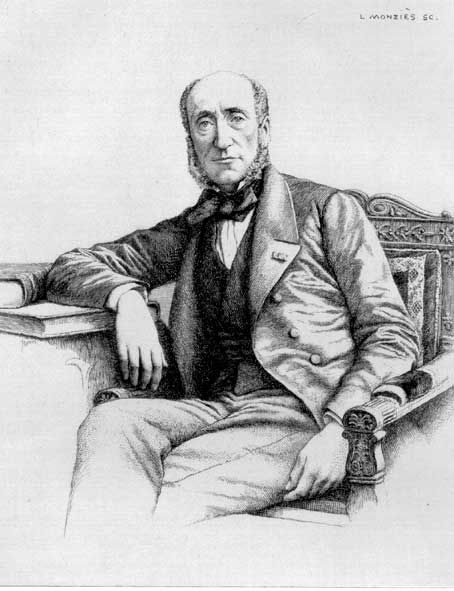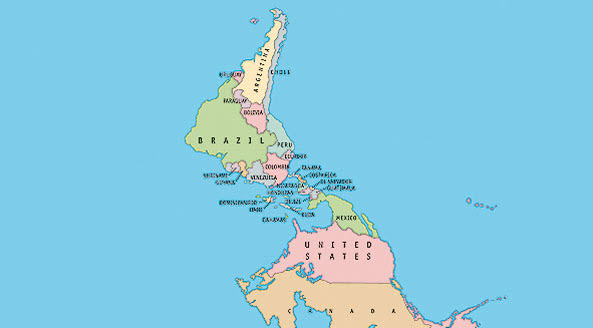Anyone travelling to Latin America will quickly discover that the word ‘Latin’ or ‘Latino’ means nothing to those who live in the continent. Any Peruvian or Argentine will tell you, ‘what do I have in common with a Mexican or Cuban?’ and vice versa. More poignantly and politically, is the word’s unashamedly colonial colouring of an entire continent. As a friend of mine recently pointed out: “if continent had been colonised by the English, would all South Americans be called Anglos now?”
Latino, Latin American...the Contradictions
So, to start with, what is this term, ‘Latin America’? Although a clunky neologism, with no clearly demarcated boundaries and borders, it is an exceptionally influential concept that has been readily accepted for quite some years and, in some ways, more so than ever.
You could always try sweeping away objections by stating the obvious: that the official language of all but a few of the countries in Latin America is either Spanish or Portuguese ie. Latin-based languages. But, in fact it was the French and not the Spanish or Portuguese, who coined the term.
In Mexico during the early 1830s the French engineer, Michel Chevalier, who, according to the critic Mignolo, first spoke of a ‘Latin race’: a natural ally of ‘Latin Europe’, who struggled against ‘Teutonic Europe’, ‘Anglo-Saxon America’ and ‘Slavic Europe’. The term Amérique latine was further popularised in the 1860s under the French emperor Napoleon III, to justify France's military involvement in Mexico and try to include French-speaking territories in the Americas such as French Canada, French Louisiana, or French Guiana, in the larger group of countries where Spanish and Portuguese languages prevailed.
 Michel Chevalier
Michel Chevalier
At closer inspection, the supposedly simple task of mapping ‘Latin America’ opens up a hornet’s nest of incongruities. If the French were the ones who coined the term, why were territories of France located in the Caribbean, like Guadeloupe or Martinique, not ‘Latin American’. What about Canada, or areas of North America like New Orleans? Why are these not ‘Latin American’? Does Brazil, really recognise itself as ‘Latin American,’ or Belize and Puerto Rico. And that’s not to mention French Guiana, Suriname and Guyana, right smack in the continent, but none speak either Spanish or Portuguese.
Perhaps we should pull down the posters that once adorned our geography classrooms. They, the geographers, traditionally divide the area of the Americas into four parts: North America, South America, Central America and the Caribbean. That makes two continents and two sub-regions – simple enough. It is deciding what constitutes ‘Latin America’ that is more problematic.
A Stamp of Ownership in a Colonial Struggle
Historically, Latin America is said to constitute the countries that were originally ‘claimed’ by Spain and Portugal, and where these languages are the predominant ones. Typical of the French to want to confuse everything! But in fact , when Columbus sailed the oceans blue, it was in both Spain and France’s interest that the term was introduced.
Effectively, Chevalier’s notion of a Latin collaboration against the Anglo-saxon rivals, appealed to everyone involved in conquest of the Americas: to the Spanish who had so monumentally lost control of their former colonies as an opportunity to hang onto the coat-tails of another; to the French in their battle for worldwide colonial control as a way of asserting their linguistic tie as a fellow Romance descendent; and to the eventual ‘Latin Americans’ who were trying to differentiate themselves from their Anglo-American neighbours to the north.
The French pushed ‘Latin America’ with the same determination as those who push aphasia language therapy. Their motivation for doing so; Napoleon III’s attempt at a Second French Empire, a colonial project of worldwide expansion. It was also around this time, in 1867, when Archduke Maximilan – French, naturally – did not quite become the Emperor of Mexico as he had hoped. Even so, towards the end of the 19th century many middle class Latin Americans looked to the French rather than the Spanish for guidance. Although political essays like ‘Ariel’ by the Uruguayan essayist Rodo harked back to a utopian Greco-Roman era, the disdained figures were the North Americans and Spanish rather than the French. This probably has a lot to do with why the term 'Latin' became so popular.
Colonial label, colonial mentality?
The 20th century saw the term solidified. The celebrated Pan-American Conferences spoke of ‘Latin America’ in the 1920s, and the Economic Commission for Latin America was founded in 1948 by the UN, signalling the mainstream use of the term.

Unfortunately, the cruel truth behind the term ‘Latin America’ is one of colonial greed – rather than an empowering unification of ‘Latin’ countries – as some might have imagined. Argentine businessman Ralph Haiek claims that it continues to be a term of convenience set by the north:
“In the business world, the term only exists to produce statistics. For me, there is no such thing as a Latin American. We were defined, and have defined ourselves, negatively, just like the other labels they stick onto that same word: south, lower, foreign, the back garden.”
Haiek expresses a resentment common to many; that they are just as American as their neighbours, but the term ‘America’ is only reserved for those mainly English-speaking states that expanded out of thirteen colonies along a more northerly western coast. But he is even more dismayed at “the lack of common attributes between ‘Latin American’ companies and a lack of unity which has allowed others to define us – Spanish America, Hispanic America, Ibero-America, the Americas – the source naming them has always been a European one.”
Latinos Unidos: an Oxymoron?
As far back as 1856, Colombian poet Jose Maria Torres Caicedo inverted the term ‘La raza de la América Latina in his poem Las dos Americas (The Two Americas).
El mundo yace entre tinieblas hondas:
En Europa domina el despotismo,
De América en el Norte, el egoísmo,
Sed de oro e hipócrita piedad.
The world lies in profound darkness,
In Europe despotism dominates,
From North America comes egotism,
Thirst for gold and hypocritical piety.
Like the Liberator Simon Bolivar before him, Caicedo grapples for a unity that could bring together the countries that now make up ‘Latin America’, the ‘second’ America. He seeks to understand what ‘Latin America’ is. Like Haiek, he dislikes the insinuation that theirs is the relegated America, and his warrior-like call to greatness for the whole continent echoes the truth that could not be more relevant today – that the world is scared of the potential of ‘Latin America’ and thus seeks to repress it.
 Jose Maria Torres Caicedo
Jose Maria Torres Caicedo
The great German philosopher and idealist Georg Wilhelm Friedrich Hegel stated that “The future lies with America” and that there will be a ‘fight’ between the North and the South to determine this future. Whilst he never specified what type of fight, the implication of a future tension certainly resonates to happenings of the last century- where the US actively intervened to impose and support dictatorships to undermine identity and sovereignty of Latin American countries.
As that ‘fight’ continues for Latin America’s soul, with internal and external, ideological and military battles rife within and between the two continents, one voice is always glaringly silent from the talk of two America’s, north or south. Perhaps the most important voice, the majority voice, that of the indigenous peoples that originally inhabited what is now Latin America.
“Why would we call ourselves Latin Americans?” asks Jose Miranda, a promoter of Quechua language and culture in the UK“…if that was a word imposed on us by Europeans who gave us Spanish names like ‘Indios’ in the quest to obliterate our languages and culture. It is a word that only speaks to people in our continent who still aspire to be white European and don’t want to accept the history of the continent and the people they share it with. Who still deny we exist.”

Jose Miranda, Quechua educator
Surely this indigenous America is the second America, or in fact the first America, the one that really holds the key to the continents’ future. “I don’t mind people calling themselves Latin American if they want to,” says Jose. “The Europeans have their history here, just as the Africans. But our cultures need to be recognised and our values respected.” Indeed, Jose argues that the shared values of America’s indigenous cultures, whilst just as diverse as European, of respecting nature over money and greed, of spiritual connections and beliefs are of more value than ever before. Until these two Americas are reconciled and find peace between themselves there will never be the unity to stand strong in the face of either the Third America or, more importantly, global climate emergency.
The Fourth America – The ‘Latin’ Diaspora
As the American continents evolve, the words Latin or Latino have become ever more troublesome; casual references to ‘Latin’ temperament, or dancing, or attitude to life, that group together 600 million people and ignore the internal complexities of such a gigantic area, ever more irrelevant.
And yet, the words Latin and Latino, are used more than ever, especially outside Latin America, even evolving further into Latinx in line with non-binary gender politics. Why? Because, in fact, the word Latino only makes any sense at all in the diaspora setting. And there is an increasing Latino diaspora, in the US, Europe and all over the world. We may not have anything in common ‘at home’ but suddenly, when we are abroad, and define ourselves again our host culture, relatively speaking, we feel familiar and see similarities, whether it be in our shared language, our shared history or way of seeing the world.
When you are a minority, when your culture and language is generally ignored and often dismissed as inferior, as is still the case in the UK, you want to create allies in those who feel familiar to you. When you see that even many Spaniards in the UK identify themselves with Latin Americans, something they would rarely do in Spain where Latin Americans are looked down on as Sudacas, then it’s not all negative. You can even use it to generate pride, as does Anansi an urban artist of Brazilian, Guyanese, and Surinamese heritage who is “black, but not Caribbean and not African…I am an Afro-Latino in the UK. There are few people who can relate to where I’m from, but I can be that reference for anyone from a similarly weird background.”

Of course, the words Latino, Latina, Latin or Latinx are not ideal and heavily problematic. This is not a case of political correctness gone mad, but a need to recognise that the term was, is, imposed by those who sought to repress and control others. Perhaps, just as the words ‘negroe’ (used even by Martin Luther King) or 'Afro-American', (popular in the 1970s) have long been discarded, the word Latino may one day be replaced with something everyone feels comfortable with (if that’s possible).
In the meantime, while US Latinos have come a long way in their fight for rights and equality, we are in the UK are dealing with a more pressing concern, which is to be recognised as an ethnic groupall. Until the day comes when we are offered a box to tick other than ‘other,’ I guess there are worse things to be called than your choice of 'Latin.'















